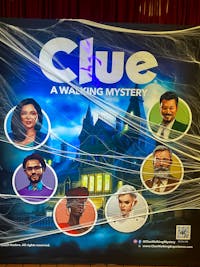Endgame' boasts worthwhile players
American Repertory Theatre's current production of existential playwright Samuel Beckett's 1955 play Endgame, directed by Marcus Stern, associate director of A.R.T., features a full cast of professional actors with nearly 300 productions between them. The nationally renowned American Repertory Theatre, which will celebrate its 30th year in Cambridge this fall, has won numerous awards including the Tony Award and the Pulitzer Prize. Time Magazine recently named it one of the top three theaters in the nation. A.R.T. is housed at two locations, the Loeb Drama Center, their mainstage and the location of the current production of Endgame, and the Zero Arrow Theatre, both of which are adjacent to Harvard University. The play opens with a spotlight highlighting a cloaked, wheelchair-bound Hamm, played by Will Lebow, followed by the illumination of Hamm's adopted son/servant, Clov, played by Thomas Derrah. Finally, a harsh, white light, which remains throughout the duration of the play, fills the stage. Sparse and raw in every regard, the hour-and-a-half, four-character production unfolds on a single stark set that consists of three bare, off-white walls soiled with the brown residue of water leaks, two curtained windows (which Clov, to great absurd effect, determinedly opens to reveal boarded up glass with only a thin slit of windowpane visible), a radiator and a door to "Clov's kitchen." It could be a nearly normal, if drab and mundane, house. On the right wall, however, a picture is hung with the back facing out, and at the front of the stage, embedded in the wood floor sit two lidded metal trash cans in which live Hamm's pitiful, hoary-headed parents, Nagg (played by Remo Airaldi) and Nell (played by A.R.T. founding member Karen McDonald). The effect of the set is an absurd confusion of inside and out, "us" and the world-ambiguities which set the foggy air of absurd yet realistic contradiction which is the permeating, vivifying force of the play. An obvious tragedy, Beckett nonetheless intended for the play to be simultaneously comedic, through both the attempts at jokes by Hamm and Clov and the unintentionally absurd deportment of all four characters.
The set that is the "gameboard" of Endgame never changes, foregrounding the characters and their interactions with each other. The game is not so much one player versus another, but each player versus the board, which represents existence. Though Hamm would have it "end with a bang," in the end the game fades away, as each of the four characters both hates and needs the others in what develops as a painful and nearly unbearable tragedy.
In an ambiguous comment on the motivations of humanity, we learn that Hamm adopted the orphan Clov as his son but now treats him as his slave. He calls him with the harsh grating of a whistle at his every capricious whim, reminding Clov of his past magnanimity in adopting him when Clov's gratitude seems lacking. While on the whole Lebow's performance resonates with the cold despair of a life circumscribed by darkness and immovability, he falters with a Fonzy-like delivery of Hamm's attempts at jokes. Clov is a character whose seeming simpleness belies an insight and a soul torturously split between loyalty to his father/master and his own aspirations. Derrah, whose 114 previous productions include The Seagull, Mother Courage, Our Town and the 2003 film Mystic River, delivers a highly animated and movement-filled performance that serves as the perfect foil for the icy, stationary Hamm. Nagg and Nell are the most human and personable and the least hateable of the four. White of hair and white of clothes, they exemplify the forgetful purity of old age returning to its source.
An existential drama, Endgame is at its heart existence devoid of the veil of life. Watching the plot tumble along is like watching the stars and the deep hollow black of space without the distorting effects of the atmosphere. Stark and bitter yet humorous in the absurd unavoidability of the end, the playwright's voice rings clearly throughout the play.
While many dramatic works deal with death on one level or another, Endgame is not simply a play about finality-and therein lies its unique attraction. In the half decade immediately preceding the penning of Endgame, Beckett witnessed the inevitable decline and death of his mother from Parkinson's disease and his brother from lung cancer four years later as he sat by their bedsides until the end. Through these experiences Beckett comes to realize that existence is not meant to be won-it is merely "something . taking its course."
Born from the darkest period in Beckett's life, Endgame is a portrayal of a family in rather than on the brink. It is the journey-not the destination-with which Beckett most identifies. No one can ever truly know the end. All we can see is existence and the moment immediately before it vanishes, and such is the resonant beauty of Endgame.



Please note All comments are eligible for publication in The Justice.